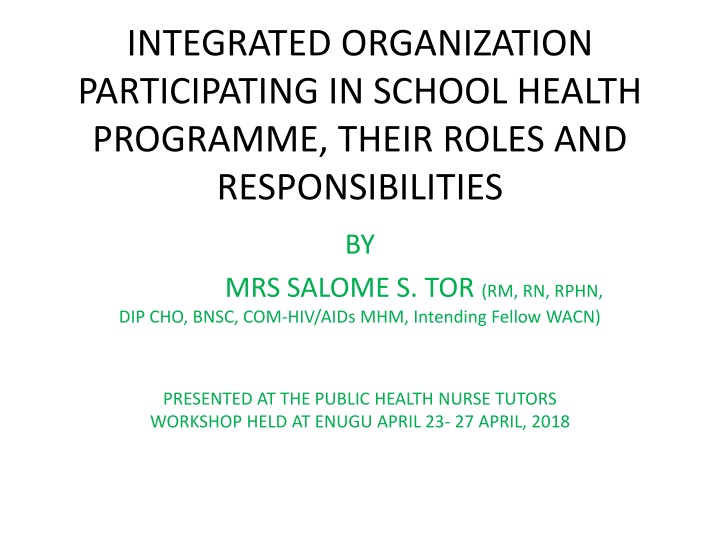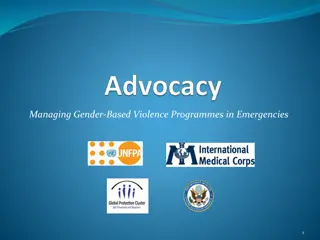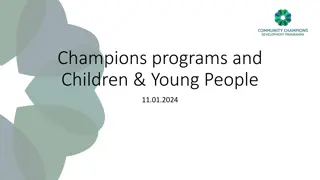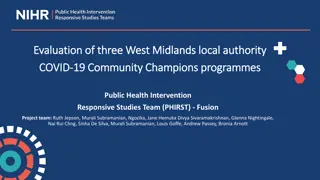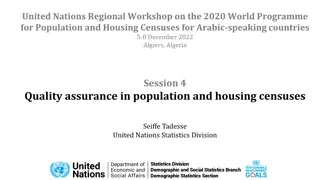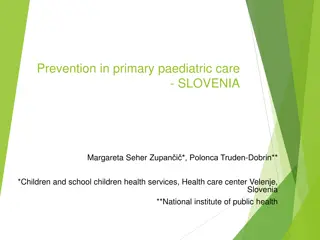Roles and Responsibilities of Organizations in School Health Programmes
History shows the evolution of school health programmes dating back to the 19th century, highlighting their importance in promoting public health and preventing diseases. Organizations play key roles in implementing school health policies, with a focus on the health and development of the school community. The collaboration between educational and health authorities has led to the establishment of legal frameworks for these programmes, ensuring their effective implementation.
Uploaded on Oct 04, 2024 | 2 Views
Download Presentation

Please find below an Image/Link to download the presentation.
The content on the website is provided AS IS for your information and personal use only. It may not be sold, licensed, or shared on other websites without obtaining consent from the author.If you encounter any issues during the download, it is possible that the publisher has removed the file from their server.
You are allowed to download the files provided on this website for personal or commercial use, subject to the condition that they are used lawfully. All files are the property of their respective owners.
The content on the website is provided AS IS for your information and personal use only. It may not be sold, licensed, or shared on other websites without obtaining consent from the author.
E N D
Presentation Transcript
INTEGRATED ORGANIZATION PARTICIPATING IN SCHOOL HEALTH PROGRAMME, THEIR ROLES AND RESPONSIBILITIES BY MRS SALOME S. TOR (RM, RN, RPHN, DIP CHO, BNSC, COM-HIV/AIDs MHM, Intending Fellow WACN) PRESENTED AT THE PUBLIC HEALTH NURSE TUTORS WORKSHOP HELD AT ENUGU APRIL 23- 27 APRIL, 2018
Presentation outline Introduction and Background Information on SHP Definition of terms Vision and Mission Statement of SHP in Nigeria List of organizations Roles and Responsibilities Public Health Nurses Contribution Summary and Conclusion References
Introduction and Background History of school health date back as the 19th Century. In 1850, the Sanitary Commission in Massachusetts headed by Lemuel Shattuck produced a report that became very classic in the field of Public Health and had a significant influence on school health. This led to school health programme receiving major attention as a means to promote public health and prevent disease.
Introduction Cont. Between late 19thCentury and early 20th Century, many schools in America followed up with programmes in promoting and maintaining health in schools. School Nurses were employed who focused their attention on home visits to families with children who had been excluded from schools because of illnesses or infection, encouraging those families to have their children treated and returned to school
Introduction cont. School Health Programme (SHP) comprises of all projects / activities in the school environment for the promotion of the health and development of the school community. The Programme is one of the strategies for the achievement of Health For All (HFA) declaration; education and health related Millennium Development Goals (MDGs); Now SDGs, the National Economic Empowerment and Development Strategy (NEEDS); Now Vision 2020, the Education for All (EFA); The Universal Basic Education Act (2004); and goals of the National Policy on Education (2004).
cont In November 2006, The Federal Ministry of Education in collaboration with Federal Ministry of Health, Supporting Partners and Relevant Stakeholders developed the FINAL SCHOOL HEALTH POLICY- which serve as a legal framework for the implementation of school health programme in Nigeria.
Definition of terms 1. School is an institution for educating learners. In the context of this policy, it includes Early Child-Care Centers (ECCC), Primary and Secondary Schools, and Non-Formal Education Centers (NFE). 2 .School Community refers to all the people living/working within the school premises including pupils / students, the teaching and non-teaching staff as well as members of their families. 3. Health, according to the World Health Organization (WHO) is a state of complete physical, mental and social well- being and not merely the absence of disease or infirmity.
Definition of terms cont. 4. Service is a system or arrangement that supplies public needs. It could be organized by an individual, group or the government. 5. School Health Programme, in the context of this policy, is a series of harmonized projects / activities in the school environment for the promotion of the health and development of the school community 6. School Health Day, shall refer to a day set aside annually to create awareness on health related issues in the schools.
Definition of terms cont. The World Health Organization (WHO) defined a health promoting school as one that is constantly strengthening its capacity as a healthy setting for living, learning and working. Such schools foster healthy and learning environment.
VISION and MISSION STATEMENT OF SHP IN NIGERIA Vision Statement of school policy in Nigeria Promoting Health of learners to achieve Education for All (EFA) and Health for All (HFA) in Nigeria Mission Statement of school health policy in Nigeria To put in place adequate facilities, resources and programmes, this will guarantee physical and mental health, social well being, and the safety and security of the school community which will promote the learning outcomes of the child (FMOE, Final School Health Policy in Nigeria pg4, November 2006)
List of Organizations involved in SHP World Health Organization (WHO) United Nations International Children s Fund (UNICEF) Red Cross Society Security Organizations Road Safety Relevant Ministries; Education, Health/ Related Agencies, Environment/Environmental Protection Agency, Agriculture, Water Resources, Information, Women Affairs Other relevant Stakeholders; National Association of Parents Teachers Association of Nigeria (NAPTAN), Nigerian School Health Association (NSHA), NUT, PAN etc.
The 12 WHO Criteria for a Health- Promoting School 1. Active promotion of self-esteem of all pupils by demonstrating that everyone can make a contribution to the life of the school 2. Development of good relations between staff and pupils and among pupils in the daily life of the school 3. Clarification for staff and pupils of the social aims of the school 4. Provision of stimulating challenges for all pupils through a wide range of activities 5. Use of every opportunity to improve the physical environment of the school 6. Development of good links between school, home and community
7.Development of good links among associated primary and secondary schools to plan a coherent health education curriculum 8. Active promotion of the health and well-being of the school and staff 9. Consideration of the role of staff as exemplars in health- related issues 10. Consideration of the complementary role of school meals (if provided) to the health education curriculum 11. Realization of the potential of specialist services in the community for advice and support in health education 12. Development of the education potential of school health services beyond routine screening and towards active support for the curriculum
UNICEF UNICEF s support to the basic education programme in Nigeria strives to offer education opportunities to all children of primary school age and eliminate exclusion of all kinds. Its objectives are to: Improve net primary school enrolment, retention and educational attainment in formal schools. Improve participation in non-formal and early childhood centers. Reduce the number of girls out of school and improve their learning outcomes. clubs.
Promote and mainstream gender sensitive child-friendly education. Enhance and integrate health, sanitation and hygiene education, including HIV/AIDS prevention in formal and non-formal education sectors. Support closely linked programmes or projects to promote healthy education example, provision of water facilities (boreholes, sanitary facilities, toilets for boys and girls and establishment of health
UNESCO The concept of a health promoting school as promoted by WHO and supported by UNESCO is useful in realizing the scope of school-related health issues extending beyond the classroom. The health promoting school recognizes that health is not only developed through the taught curriculum, but extends to learning in and through the school, home and community. A health promoting school aims to enable pupils, staff and the community it serves to take action for a healthier life, school and society through;
1.The promotion of pupils' lifestyle through the inculcation of correct health concepts and behavioral patterns, 2. The ultimate objective of enabling the pupil to make the best possible choice for his or her optimum health and total well-being. 3. To improve the school and family environment. 4. To enhance the role of pupils in ensuring a successful school programme period
RED CROSS SOCIETY Red Cross Society is responsible for disaster management and health care provision to affected people. It promotes the establishment of the club in schools where school children are taught basic health prevention tips like prevention of accidents at home and schools, first aid management, prevention of fire outbreak etc
SECURITY AGENCIES With the growing violence experienced by school children all over the world, the role of security agencies must be strengthened to curb the menace and ensure safe learning environment for both students and teachers. Security agencies in collaboration with school authorities provide 24 hour security surveillance around school locations Schools must be sited in secure environment Internal security must be provided by the school with the use of ICT School children must be taught security tips in their curriculum
RELEVANT MINISTRIES AND AGENCIES State Universal Basic Education Boards to Collaborate with SME for monitoring and evaluation of skill-based health education activities. Nigeria Educational Research and Development Council to Review and update periodically the skill- based health education curriculum Assist in designing and development of skill-based health education materials. Cooperate with the FME School Health Division in establishing skill-based health education networking system including production of needed texts and other print materials.
Cont. State Governments to Advice and support LGAs on the implementation of skill-based health education activities such as environmental sanitation, house to house inspection and immunization programmes Implement decisions made by the FME Health Education Division relating to skill based health education issues. Ensure that skill-based health education delivery in the State is in accordance with the National Policy on School Health Conduct seminars and workshops on skill-based health education for teachers at various levels. Support schools in the designing, pre-testing and production of culturally acceptable IEC
Cont. Ministry of Environment/ Environmental Health Protection Agency or Board (AEPA/B) is responsible sanitation in schools and this include the following; Cleanliness of the school environment including the toilets, the kitchen, food stores and the classrooms is mandatory. Drinking water must be covered and kept way from contamination. Refuse must be collected using sanitary dustbin and kept at strategic locations around the classrooms and hostels. Refuse shall be disposed daily from the point of generation to the point of final disposal.
Sewage, storm and rainwater shall be properly managed and drained. Domestic animals at residential areas within the school premises must be adequately confined and all refuse shall be properly disposed using appropriate sanitary methods. Refuse Disposal Facilities must be adequate Adequate and sufficient number of rust resistant, water and rodent proof covered containers must be provided. Where possible, incinerators, composting and land fill should be provided.
Cont. Toilet/Bath Facilities - The toilet facilities shall be gender sensitive for both learners and staff. Constructed compartmentalized Ventilated Improved Pit (VIP) Latrines shall be promoted. Where appropriate, Water Closet (WC) facilities will be encouraged. There shall be at least a toilet compartment for every 30 learners. The school shall provide fitted urinal for boys. Adequate and separate bathrooms for males and females especially in boarding schools must be provided. The toilet and bath must be kept clean, disinfected and controlled against pests.
Cont. Road Furniture/Safety should be provided through adequate road signs and markings on the roads leading to the schools. These should include informative, regulatory/warning signs and Zebra crossings at least 5km radius at 1km interval from school. At least 5 speed breakers (at 1km interval) should be provided by Federal and States Ministries of Works and other line ministries, on the major or minor roads leading to the schools so as to help regulate the speed behaviour of motorists and other road users.
At school locations where the traffic density is appreciably high, overhead crossing facilities (i.e. flyovers) should be constructed to help discourage risky road use behaviours. School recreational facilities (e.g playgrounds/pitches) should be located as far away from the roads as far as possible in order to guard against children running into the roads without warning
Cont. Side rails or cross bars shall be fixed on school locations with high road traffic densities so as to promote organised crossing of the roads by the students/staff. vi. FME to explore systematic implementation of the 2005 National Council of Education approved road safety awareness programme in schools through the reproduction of the NERDC/NCE approved cartoon book for use in schools.
cont Waste Water Management is very important to ensure quality life in school and prevent illnesses. Schools should have adequate and functional drainage system to manage wastewater from bath, kitchen and surface run- offs. ii. Rainwater and surface run-offs may be collected for reuse. iii. Drainages shall be cleaned regularly, disinfected and covered.
Cont. Partnership and Collaboration with Relevant ministries, agencies, parastatal and departments at the three tiers of government as well as the organized private sector and the civil society shall collaborate with the education sector in the implementation of all aspect of healthful school environment. Such partners shall include but not limited to the following ministries / departments: i. Health ii. Water Resources iii. Environment iv. Information and National Orientation v. Housing and Urban Development vi. Works vii. Sports and Social Development viii. Women Affairs ix. National Planning Commission Partnership and
Cont. Advocacy and resource mobilization Political commitment, financial and technical support shall be enlisted from policy makers and other stakeholders at all levels for effective promotion of healthful school environment. Monitoring and Evaluation ;the monitoring and evaluation committees as constituted in the National School Health Policy at all levels will be responsible for the overall supervision, monitoring and evaluation of efforts towards healthful school environment.
Cont. In doing so, the committee shall collaborate with relevant agencies in the inspection and enforcement of necessary sanctions as related to the following: i. Appropriateness of the location and size of the school ii. Availability of recreation facilities iii. Physical structures and buildings Management of Water source v. Management of Sanitation facilities
PUBLIC HEALTH NURSES CONTRIBUTION Public Health Nurses as polyvalent Nurses have a great role to play to ensure the success of the implementation of school health programme in Nigeria. At every level of their disposition, while in active service or not, their skills on intersectional collaboration must come to play in order to contribute effectively. Through regular interaction with colleagues who are directly in school health programme, sharing of ideas on best practices will go a long way to boost the success of this programme
Cont Other ways public health nurses can play a role in promoting school health programme is through being active members of Parents Teachers Association As advocates, Public Health Nurses can advocate to stakeholders and opinion leaders to support school health programme Public Health Nurses under school health programme must ensure that it is implemented according to national guidelines Last but not the least, the overall success of school health programme should commence from training level. Public health nurses must be trained adequately on how to manage school health programme effectively.
SUMMARY AND CONTRIBUTION In 1980, Three Component model on school health programme was expanded to eight by Kolbe, Allensworth as follows; 1. Health education which consists of a planned, sequential, K 12 curriculum that addresses the physical, mental, emotional, and social dimensions of health 2. Physical education is a planned, sequential, K 12 curriculum promoting physical fitness and activities that all students could enjoy and pursue throughout their lives.
Summary and Conclusion Cont. Health services which focus on prevention and early intervention, including the provision of emergency care, primary care, access and referral to community health services, and management of chronic health conditions. Services are provided to students as individuals and in groups. 4. Nutrition services provides access to a variety of nutritious and appealing meals, an environment that promotes healthful food choices, and support for nutrition instruction in the classroom and cafeteria.
Cont. 5. Health promotion for staff provides health assessments, education, and fitness activities for faculty and staff, and encourages their greater commitment to promoting students' health by becoming positive role models. 6. Counseling, psychological, and social services include school-based interventions and referrals to community providers. 7. Healthy school environment addresses both the physical and psychosocial climate of the school. 8.Parent and community involvement engage a wide range of resources and support to enhance the health and well-being of students.
Cont. With details above, school health programme can only succeed with active contributions from inter-related organizations and stakeholders. So all hands must be on deck. Schools are building blocks for children for a better life in future, therefore it is imperative that the foundation of these children must be solid in all aspects of life. Health is a fundamental human right for all irrespective of age, race, gender, social status and religion.
REFERENCES 1. Expanded Component of School Health Programme by Kolbe,1986, Allensworth and Kolbe 1987 2. Evolution of School Health Programme- www.ncbi.nlm.nil.gov/books/NBK,231148 3. Historical Overview of School Health www.nap.edu/read/5153/chapter4 4. Federal Ministry of Education in Nigeria- Final School Health Policy, November,2006 5. Implementing Guidelines on National School Health Programme, December, 2006
